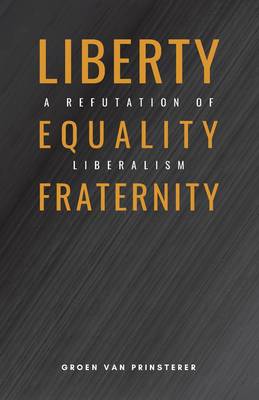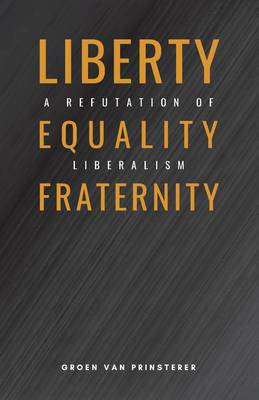
- Retrait gratuit dans votre magasin Club
- 7.000.000 titres dans notre catalogue
- Payer en toute sécurité
- Toujours un magasin près de chez vous
- Retrait gratuit dans votre magasin Club
- 7.000.0000 titres dans notre catalogue
- Payer en toute sécurité
- Toujours un magasin près de chez vous
Liberty, Equality, Fraternity
A Refutation of Liberalism
Groen Van PrinstererDescription
In the middle of the 19th century, the Netherlands struggled with revolutionary fervor. The Enlightenment ideas represented by the motto, "Liberty, Equality, Fraternity," threatened to destroy much of the good that the Dutch Fatherland had inherited. The Dutch historical icon, Groen van Prinsterer, picked up his pen in response.
It was in opposition to the doctrines of 1789 that modern Conservatism was born. A disciple of Edmund Burke, a mentor to Abraham Kuyper, and endorsed by Herman Bavinck, Dutch Conservatism found one of its greatest voices in Groen.
He argues that the Revolution promises freedom yet enslaves; promises equality yet promotes inequality; promises brotherhood, yet these ideas have made men more isolated and violent than ever before. By contrast, he argues, true liberty, equality, and fraternity are found only in Christ and the Christian faith. The secular rejection of God produces a false hope in a bankrupt ideology. Groen begins with a historical analysis of the effects of the Enlightenment motto, then the philosophy itself, followed by the Christian alternative.
Often witty and sarcastic, Liberty, Equality, Fraternity was originally a popular and accessible version of Groen's magnum opus, Unbelief and Revolution. Students of neo-Calvinism, Reformed Conservatism, or Dutch history in general will alike enjoy the accessible prose, rhetorical elegance, and fiery punch delivered by one of Holland's greatest Parliamentarians.
Spécifications
Parties prenantes
- Auteur(s) :
- Editeur:
Contenu
- Nombre de pages :
- 164
- Langue:
- Anglais
Caractéristiques
- EAN:
- 9781954504004
- Date de parution :
- 19-05-22
- Format:
- Livre broché
- Format numérique:
- Trade paperback (VS)
- Dimensions :
- 140 mm x 216 mm
- Poids :
- 195 g

Les avis
Nous publions uniquement les avis qui respectent les conditions requises. Consultez nos conditions pour les avis.






